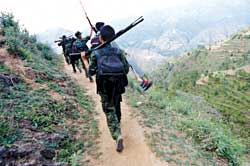 The Brussels-based International Crisis Group (ICG) is an independent, non-profit organisation working through field-based analysis to prevent and resolve deadly conflict. This is a shortened version of a testimony by the ICG's John Norris at a US House of Representatives Human Right Caucus hearing on Nepal on 21 November.
The Brussels-based International Crisis Group (ICG) is an independent, non-profit organisation working through field-based analysis to prevent and resolve deadly conflict. This is a shortened version of a testimony by the ICG's John Norris at a US House of Representatives Human Right Caucus hearing on Nepal on 21 November.
Despite the initial promise of a ceasefire and a return by the royalist government and the Communist Party of Nepal (Maoist) to negotiations, these peace talks steadily deteriorated due largely to a failure to establish effective confidence building and monitoring measures in the field. Currently, the conflict continues to take on a triangular dynamic between the Maoists, the royalist government and the mainstream political parties that have been shut out of power since King Gyanendra suspended the democratic system in October 2002.
Both the Maoists and the government forces have adopted new battlefield strategies as the war has resumed. The Maoists have moved away from mass attacks on district police and army headquarters, and have instead used small cells to carry out a steady assassination campaign, including in Kathmandu. Army, police and political party officials, particularly those party members that are seen as close to the palace, are the most common targets. The Maoists have also significantly expanded their activities in eastern Nepal and the tarai-areas that had largely been spared the worst fighting earlier in the war.
The Royal Nepali Army, having significantly upgraded its firepower and improved base defenses during the ceasefire, has claimed a number of successful offensives and tried to carry the fight more directly to the Maoists. Substantiating the battlefield claims of both sides remains difficult, but it does remain clear that most of those being killed in Nepal are non-combatants. With both the Maoists and the Royal Nepali Army determined to use battlefield gains to secure leverage for future talks, the danger of a widening conflict is substantial.
Despite mounting international pressure for the palace and the political parties to work together, King Gyanendra still appears reluctant to install a genuine all-party government or fully restore the democratic process, although speculation concerning a possible change in prime minister is an almost daily occurrence. Prime Minister Surya Bahadur Thapa continues to stress the importance of restoring democracy, but this commitment has not gone beyond rhetoric.
Both the Maoists and the Royal Nepali Army continue to commit human rights abuses on a widespread basis and there appears to be virtually no legal or political recourse for the victims of such abuses. The Doramba incident, and any number of others since the ceasefire collapsed, call into question the efficacy of international military assistance to and training of the Royal Nepali Army.
Maoist forces have engaged in equally serious human rights abuses, assassinating key political and military figures, robbing banks and killing local journalists. Across Nepal, the Maoists practice extortion and these 'donations' are most often collected at the point of a gun. The Maoists' reliance on homemade explosive devices is a clear threat to civilians. There is credible evidence of forced recruiting by the Maoists, including a number of child soldiers. Most rural Nepalis find themselves caught between Maoist cadres and a royalist military often willing to use indiscriminate force.
On November 4, 2003, Prime Minister Surya Bahadur Thapa unveiled an initiative to establish 'Rural Volunteer Security Groups and Peace Committees' to fight Maoist rebels. Nepali government ministers have argued that such armed village defense committees could better protect communities from rebel violence, but experiences from around the globe have almost universally proven civilian militias to be a disaster. With no training and no oversight, armed vigilante groups tend to intensify a conflict and the potential for such short-sighted policy to broaden the already deadly conflict in Nepal is distinct. Certainly, the US government should disavow any plan to arm civilians in a country where Washington is providing substantial military aid.
The administration continues to portray Nepal as part of the broader anti-terrorism battle, and has strongly backed a royalist government which has indefinitely suspended the democratic system. Last year, in addition to generous amounts of development assistance, Washington provided Nepal with more than 5,000 M-16 rifles as part of a broader military package worth more than $14 million. Meanwhile, US Ambassador Michael Malinowski has taken a very tough line on the Maoists, comparing them to the Khmer Rouge and the Nazis. Though the Maoists clearly do represent a serious threat, such incendiary language has done little to advance the peace process. Washington has also pushed hard for a recently approved $70 million World Bank loan to Nepal, over-riding concerns by some Bank members about Nepal's governance.
While US condemnation of Maoist atrocities has been rightfully quick and robust, too often the United States has treated serious human rights abuses by the government as little more than an inconvenience. The overall US approach to Nepal is certainly ripe for review and the immediate priority should be turning around the decision on village defense committees.
It may indeed take some military pressure on the Maoists to secure a lasting peace agreement. The arc of the war thus far has only demonstrated that unchecked human rights abuses by the government directly contribute to Maoist recruiting efforts. Nepal's return to violence is all the more unfortunate because it is not difficult to imagine a series of agreements around which the king, the Royal Nepali Army, political parties and Maoists could coalesce.
It remains clear that the sooner a genuine multiparty government is established and democracy restored, the higher the chance for a durable solution to the conflict. Washington is well positioned to use its influence to help the Nepal government move in the right direction.
www.crisisweb.org


